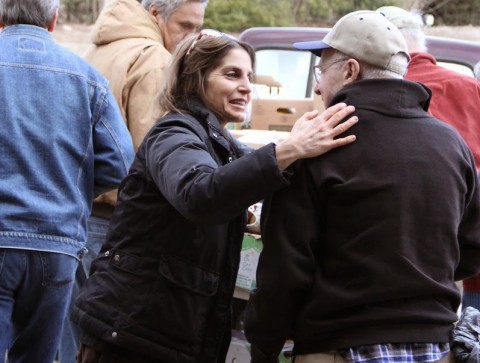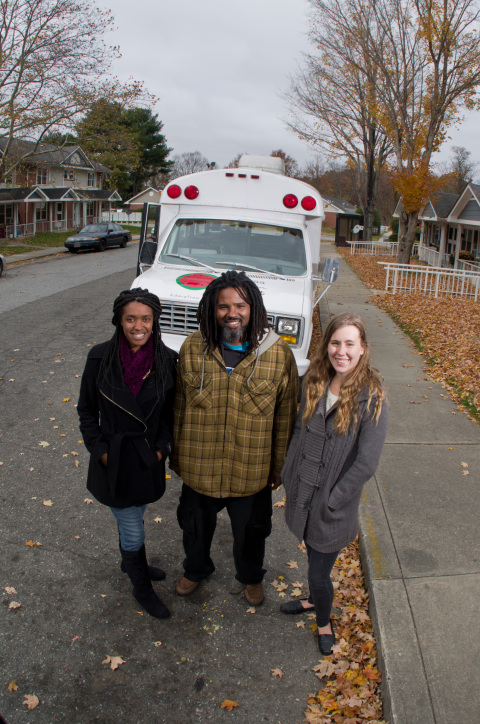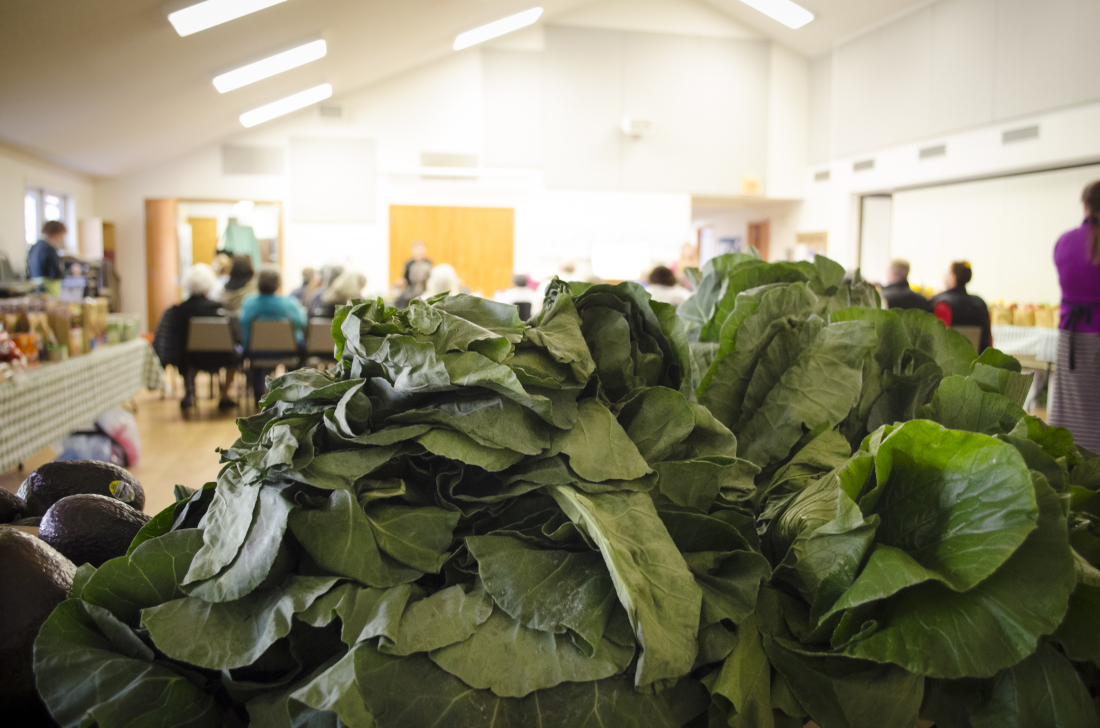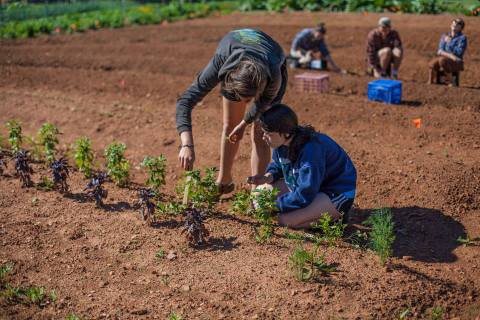Lynne Hillis was in her late 50s before she ever ate a winter squash or fresh beets. It wasn’t that she didn’t have an interest in healthy eating, but living on Supplemental Security Income means a limited budget for the Swannanoa resident — a budget that doesn’t allow for a lot of fresh produce.
“Vegetables are more expensive than meat,” Hillis notes. “Even with food stamps, I can’t go buy vegetables.”
For Hillis, recent cuts to food assistance funding and changes in eligibility meant that she experienced a $100 per month reduction in her food stamps, followed shortly by another $5. It may seem like a small amount, but Hillis says the effect was devastating. “I wish people could know how terrible it feels that $5 is important to me,” she says. “My budget is so tight that all the money I spend is on things I absolutely need.”
Hillis was able to find food assistance — and access to fresh vegetables — at Bounty & Soul, a pop-up produce market held at three locations in the Black Mountain area. The market offers food from MANNA FoodBank as well as excess produce from local grocery stores, growers and gleaners. If it wasn’t for Bounty & Soul, Hillis says, “there are days where I would be totally without hope.”
Bounty & Soul volunteer Karen Leonetti says stories like Hillis’ aren’t uncommon — but it’s also wrong to assume that everyone experiencing food insecurity in Western North Carolina is in an identical situation. “Food insecurity has many different faces,” Leonetti notes. “It’s not just someone living on $700 a month. It’s also people who have lost their jobs, who are inbetween jobs, who are newly divorced or who had to get out of a dangerous or uncomfortable situation.
“Everyone has a different reason,” she adds. “We’re all just trying to find ways to make it work.”
The unseen problem

According to MANNA FoodBank’s 2014 Map the Meal Gap study, food insecurity affects 15.3 percent of WNC, or an estimated 108,280 individuals — including more than 38,000 children. Feeding America’s 2014 Hunger in America report found that 60 percent of the households surveyed in WNC had a monthly income of $1,000 or less.
“I’ve heard several stories from moms who don’t eat so their children can eat,” says Allison Casparian, founder and executive director of Bounty & Soul. “I think people really have no idea. It’s not that people don’t care — they just don’t know. The face of hunger in this country, and especially in this area, doesn’t look like what many of us expect.”
It may be difficult to reconcile that lack of awareness with the fact that the Asheville area has received national attention as a food-insecure area. A 2012 report from the Food Research and Action Center found the Asheville metropolitan statistical area had a food hardship rate higher than several other, significantly larger, metropolitan areas — including Miami, Houston and Los Angeles. In fact, Asheville’s rate was the ninth-worst in the nation.
So what is food hardship? According to FRAC, it’s when a person does not have enough money to buy food for himself or his family. And while that may seem clear on paper, food activists like Casparian say many people still have a hard time recognizing food hardship even when it’s right in front of them.
“I had one person who came to Bounty & Soul to witness what we do, and she pulled me aside and said, ‘These people don’t need food,’” Casparian notes. “She said to me, ‘They drive, they own cars. How can they need food?’ And I realized we really need to educate on what the working poor look like.
“People think that if you own a car, if you have a job, then you should be fine,” Casparian continues. “Of course, many of my clients have cars — they have to get to their jobs. And at the end of the month, they are still choosing between buying gas for that car or buying food.”
But Casparian adds that addressing food insecurity isn’t just about providing food. It’s not just that we feed, it’s what we feed, she says, adding that it’s time to “take on the mantra of caring about the food we give out.”
“When you don’t understand food or what it can do for you, it’s just food,” she says. “From that perspective, food can be anything — fresh carrots or a bag of Cheetos. Knowing about nutrition empowers people to take back their life and their health.”
At the Bounty & Soul markets, Casparian leads classes that cover nutrition, healthy cooking, exercise and wellness. For Hillis, those classes enabled her to discover a passion for container gardening, as well as new ways to cook vegetables — and she credits that new diet and time spent in the sunshine with lowering her high cholesterol. Casparian calls these classes, and the friendships that have formed around them, “the little something extra” that is so important to her clients’ well-being.
“That little something can be knowledge — knowing you can go home and do something for yourself, for your health,” she says. “It can be that conversation they have with the person next to them that makes them happy instead of depressed, lets them know they are part of a community. It’s the connection around the food that is most important.”
From the field to the table
Providing healthy food to those who need it most is the mission of Gardens That Give WNC, a group of community gardens that share the common goal of growing food for donation. The effort, launched four years ago, now reaches across several WNC counties, connecting gardens in Asheville, Black Mountain, Swannanoa, Sylva, Cullowhee, Spruce Pine and Yancey County.
According to Susan Sides, executive director of The Lord’s Acre community garden in Fairview and a founding member of Gardens That Give, when a community comes together to grow food, it combats food insecurity on two levels. Not only does more local produce get to WNC’s food pantries and open kitchens, but more people become aware of the need experienced by their neighbors.
“What we try to tackle is community, bringing people together,” Sides says. “Information isn’t always the problem — it’s inspiration too. Part of what we do is find ways to bring people together who are not normally together. In our society, we talk to our friends, we share on social media. But we get more headway when we meet face to face, in the same room, in the same garden, and have real discourse.”
What does it take to be a garden that gives? Only the desire to help, Sides says. The gardens that currently make up the organization range in size from small plots to several acres. Some grow solely for donation, while others retain some of their yield for community supported agriculture subscribers or for the growers’ own tables. Some are faith-based, some are connected to universities. But all are united in growing food for others and spreading the movement.
In 2015, Gardens That Give, aided by Sides and interns at The Lord’s Acre, aims to produce an information booklet with simple steps that walk potential growers through starting a donation garden. It will include everything from gardening tips to ways to connect with food assistance resources. The idea is to encourage more donation gardens, not just in WNC, but across the country.
“I haven’t seen many organizations like Gardens That Give,” notes Sides. “I believe there are lots of donation gardens happening all over, but they aren’t connected. Having that connection allows us to share resources, to share information. I want to see this spread as far as it wants to go.”
In addition to producing the booklet, the organization will host its second annual garden tour in the summer. The event invites the public to visit and learn from donation gardens throughout the region, hopefully taking the idea back to their own fields.
“The more work you do, the more you begin to see happen,” Sides says. “Our goal is to build leadership within the community and create more gathering spots where people can rise up and learn from each other.”
Raise the flags
Several organizations in WNC are working to combat food insecurity. But are they working well together? The all-volunteer group Asheville-Buncombe Food Policy Council aims to connect and coordinate the many hunger-fighting efforts underway in the city and county.
“We’re looking at ‘How are we doing?’” says Mary Lou Kemph, general facilitator for the A-B Food Policy Council. “We’ve got all these different nonprofits going in different directions. We need to pull them together, have people look at the impact, measure it and figure out if we’re making a difference.”
Since forming in 2011, the group has worked with the Asheville City Council and the Housing Community Development Committee to encourage more gardening and farming in the city and the county, Kemph says. The A-B Food Policy Council makes public policy recommendations and supports community partners. The group also drafted the Food Action Plan, which was adopted by City Council in January 2013. Since its adoption, the plan has prompted policy changes allowing hoop houses and greenhouses (up to a certain size) to be built without permits, individuals to set up farm stands in their yards and farmers markets to operate in residentially zoned areas.
In past years, the group has focused on determining the direction of the initiative and recruiting members. But in 2015, Kemph says, the food council will shift its sights to accurately measuring impact. Part of that effort will involve coordinating with Buncombe County on its Community Health Improvement Process, which measures several health indicators, including nutrition, with an “online scorecard” that allows the city and the county to track and share data.
“This gets at the big questions: ‘How do we measure what we’re doing? How do we know if it’s having any kind of impact? Are we even making a difference?’ We need to know all that if we are going to continue,” Kemph says.
In the last year, representatives from the A-B Food Policy Council also journeyed to Winston-Salem for the first annual gathering of North Carolina food policy councils. At that meeting, the Asheville-Buncombe group was recognized as a leader in food councils and asked to become a mentor for newer groups, Kemph adds.
“There are all kinds of food policy councils that are springing up all over the state, but they’re very new,” she continues. “We’ve only been here for three years, but that makes us one of the oldest. The other councils are looking to us because we’ve already gotten something done.”
In 2015, the group will work to strengthen connections between other regional food policy groups, including the WNC Food Policy Council, Catawba County Food Policy Council, Caldwell Food Policy Council and Toe River Food Security Network. The A-B Food Policy Council will also lobby to have edible vegetation planted on the proposed greenways in the River Arts District.
But Kemph adds that for real work to be done, more people must become aware of the hardship around them. “We’re really still battling food insecurity,” she says. “It’s not just, ‘Wouldn’t it be nice to have some edibles in the park?’ There’s a much bigger issue. People going about their daily living, going to work, taking care of their kids — I don’t think they’re really aware of what’s happening for the less fortunate.”
Power to the people

Remember the FRAC study ranking the Asheville area as the city with the ninth-highest food hardship rate in the country? Now contrast that with the seemingly endless national media mentions given to the city’s gourmet local food scene.
“For us to be glorifying that we’re this ‘Foodtopia,’ well, it’s not really like that,” says Olufemi Lewis, co-founder and worker-owner of Ujamaa Freedom Market.
Ujamaa is a mobile market that brings local foods and pre-made sandwiches, as well as cooking demonstrations, nutritional information and books on self-empowerment and improvement, to Asheville’s low-income neighborhoods, including public housing communities. The idea behind Ujamaa, explains worker-owners Lewis, Calvin Allen and Stephanie Freeman, is to provide hand-ups, not handouts. The endeavor isn’t grant-funded, and the food isn’t free. The market is a cooperative business, one that aims to offer jobs to people who face employment barriers, including poverty or criminal backgrounds.
But Ujamaa is also about overcoming a lack of access — addressing food insecurity in Asheville’s many urban areas that are classified by the U.S. Department of Agriculture as food deserts. In several of Asheville’s low-income neighborhoods — such as the public housing developments around the Edington Center in the Southside community — the only food sources are gas stations, if there are any at all.
“Where I live in North Asheville, there are four grocery stores right by me,” Freeman says. “But when you go to a community like Hillcrest, there’s nothing. There’s Earth Fare, and it’s uphill both ways. In order to create the food, the nutrition, the education, you have to have accessibility.”
The education piece, admit the worker-owners, is an uphill battle. “There’s a different relationship with food in these communities,” Lewis notes. “‘Food comes in a bag, a box or a can.’ We have to show them how to cook food properly, or how eating fruits and vegetables raw can be nutritious.
“I do understand the culture of our society and where we’re at,” she adds. “I just hope that people will have enough in them to make the changes and choose better options. But we need to have better foods available for them in order for them to make that choice.”
The worker-owners hope to see more food security and wellness resources coming directly into communities, eliminating the need for residents to travel to get support — a sometimes impossible task if access to transportation is limited. That direct and continued interaction will allow a community to feel directly connected to its own advancement, Lewis says. “If you want to improve the health of a community and the health of individuals beyond just a class or a food pantry, there have to be better efforts to get the community involved,” she explains.
Once people take control of their own well-being, Lewis adds, they become empowered. The worker-owners say that spirit of empowerment — part of Ujamaa’s stated mission of “liberation through cooperation” — is what inspires communities to call for improved equality in other areas as well. “Food issues, housing issues, systemic racism — it’s all linked,” Lewis says. “We have to address all the issues that keep people oppressed.”




many people are just too set in their bad eating habits and just will not change to anything healthy. they only want fried foods and sugar…